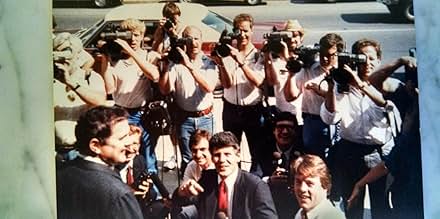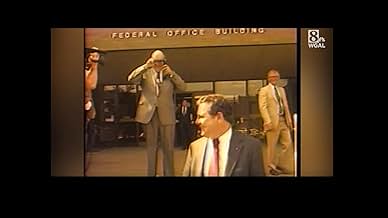Honest Man: the Life of R. Budd Dwyer is a movie about politics and corruption, suicide and survival. Four years in the making, it explores the scandal that led an honest, hard-working man t... Read allHonest Man: the Life of R. Budd Dwyer is a movie about politics and corruption, suicide and survival. Four years in the making, it explores the scandal that led an honest, hard-working man to take his own life. This independently produced feature-length documentary follows Budd D... Read allHonest Man: the Life of R. Budd Dwyer is a movie about politics and corruption, suicide and survival. Four years in the making, it explores the scandal that led an honest, hard-working man to take his own life. This independently produced feature-length documentary follows Budd Dwyer, a Pennsylvania politician who infamously committed suicide at a televised press conf... Read all
- Director
- Writers
- Stars
- Director
- Writers
- All cast & crew
- Production, box office & more at IMDbPro
Featured reviews
The film is composed entirely of interviews and news casts. Headlines and partially highlighted newspaper articles are repeatedly shown. The selection of people interviewed and the amount of air time they are given all create bias towards Dwyer.
One example is the the appointment of a federal prosecutor. The film has someone interviewed stating that the "Democratic governor" had a role in his appointment. That is far from being true as it was a federal crime. The president at the time was Ronald Reagan who was also head of the Republican party. The Attorney General of the US is appointed by the president and he in turn assigns federal prosecutors. The "documentary" tries to make it seem that the Democratic governor who felt wronged by Dwyer was out for vengeance.
Another example of biasness is when the film shows the man who gave Dwyer the bribe money. William Smith, the district Republican chief, states in one scene of the film he was surprised that Dwyer accepted the money when he offered it to him. This would seem to indicate he knew it was bribe money. The film then tries to show he lied at Dwyer's trial because he was offered a plea bargain. One scene lasts three seconds and the other 4 minutes. Be very careful while watching as you may miss items as they are being glossed over by the filmmakers. Afterwards think about all you have seen and make your own decision regarding the case.
The interviews with Dwyer's son unwittingly show how he failed as a father. His son is not a very nice or compassionate man. The film spends far too much time interviewing Bud Dwyer's friends and family. It does not spend enough time combing through the case which led to his conviction.
The "documentary" did not do a very good job when explaining the charges against Dwyer. Instead it quickly introduced the evidence and witnesses then spent more time trying to demean them. It's as if the filmmakers felt only the headlines and a few quips were sufficient. I took issue with this and realized how poorly done the film had become.
I enjoy watching documentaries and exploring issues in an unbiased manner. This film really was a let down. I would say it is more of a propaganda piece than anything else. If you always felt Bud Dwyer was innocent or were one of his supporters then this film may be enjoyable. No one can feel good about what Dwyer did in taking his own life but do not let that act cloud your own judgment when viewing the film. I can not recommend others view it.
One of the most tragic things about Dwyer's case is that what he did, or allegedly did, while in office, is something that is more-or-less legal in state and federal government today. Accepting bribes, or "political donations," isn't uncommon and since the dawn of Citizens United, is something that special interest groups and lobbyists have been doing in excess. Honest Man works to tell Dwyer's side of the story, which has been shortchanged to the extreme act itself.
Dwyer's wife, children, and colleagues all appear in the documentary and recount his life and the case that eventually engulfed his life. Dwyer studied political science and accounting in college, eventually running for the general assembly when he graduated. Roy Wilt, a colleague and a legislator, comments how politics was who Budd was and how it took over his life as soon as he began running for the assembly. He goes on to say how Budd would never look at the donators who graciously gave money to his campaign, nor could he ever bring himself to ask for money. While intelligent and crafty, he was extraordinarily humble, especially for a politician.
Controversy began to plague his career once he became Pennsylvania's state Treasurer. When Dwyer wouldn't approve of state Governor Dick Thornburgh's wife's plane ticket as a business expenditure, he saw himself on the oust with the Governor. Right then and there, from the perspective of some, Dwyer seemed stubborn as a mule and somebody who was willing to fight over the smallest circumstances. Following this, Pennsylvania discovered that its state workers had grossly overpaid in their federal taxes because of the state withholding funds. This, in turn, led to dozens of accounting firms vying for a multimillion-dollar settlement contract in order to compensate each employee for the amount they overpaid. In 1986, Dwyer allegedly received a bribe from a California accounting firm that was trying to obtain the lofty contract, to which he plead not guilty to, wouldn't agree to a plea bargain, and stood trial in the case.
The main witness to Dwyer's act of taking the bribe, William Smith, even admits to lying under oath in the documentary, saying Dwyer took the bribe during a false testimony. Smith admits here that he is, as a result, responsible for Dwyer's subsequent suicide.
Dwyer's charisma and almost blue-collar, everyman charm is seen through each piece of archival footage shown in the documentary. He was a man of many commonalities, who in and of himself, didn't seem to have any interest in unethical dealings. During his famous final press conference, it was almost as if Dwyer couldn't believe he was in this situation; he seemed shocked, almost like a deer in headlights, as if he had no idea how he found himself in this situation and was more-or-less forced into it.
The death of Dwyer is one of the most bizarre but saddening political tragedies I have yet to read of, and Honest Man does a solid job at detailing it. It's a case that found itself captured in a whirlwind of hearsay and miscalculation that led to the death of an arguably innocent man. Dwyer's surviving children explain in the film not only their reactions to their father's suicide at the time, but how, despite the suicide video's ubiquitous presence online, this kind of thing could happen again. Dwyer's widow, Joanne Dwyer, who died a year before the release of this film, nicely states how we live in a society obsessed with violence, and in this case, violence without much regard to context or history. Both her and her children state how the impact of Dwyer as a political figure and his legacy have, as a result, taken a backseat to the sensationalism and act of his suicide. They're not wrong, and it's depressing to see a story where a sympathetic, and quite possibly innocent, politician has fallen on deaf ears in present time.
Directed by: James Dirschberger.
Ultimately, it accomplishes this through one thing: William Smith's admission that he lied under oath about Dwyer's involvement. For some reason, ShoeBuckle tries to claim "the film TRIES to show he lied at Dwyer's trial". Either ShoeBuckle is not very bright or he has a reason to come back at Dwyer, because there is no trying involved. Smith himself admits it on camera. He repeatedly expresses his regret for this. It's an objective matter.
I also don't know why ShoeBuckle feels the need to attack Dwyer's son's character, but he does. The son is a normal guy, understandably somewhat embittered talking about this whole mess.
I highly recommend you watch the documentary, and also recommend you treat ShoeBuckle's review as the trash that it is.
Agree with some of the other reviews, both good and bad. The documentary is way too complimentary of Dwyer - - it comes off as something that was financed by his family and friends. As such, the first two-thirds isn't as compelling as a more evenhanded discussion of the man would have been. However, once the day of his suicide is the focus, the documentary picks up, especially with discussion of how the media reacted to the incident. My experience of seeing the suicide happen has made me naturally interested in all things Dwyer; I'm not sure this documentary would make someone who doesn't have the natural interest in the story interested in it.
Did you know
- TriviaThis was the only on camera interview William Smith ever gave.
- Quotes
William Smith: In my trial, I testified, I think I testified that I didn't offer him the money. But in fact, I did.
Details
- Release date
- Country of origin
- Official site
- Language
- Filming locations
- Production company
- See more company credits at IMDbPro
- Runtime
- 1h 16m(76 min)
- Color
- Aspect ratio
- 1.78 : 1















